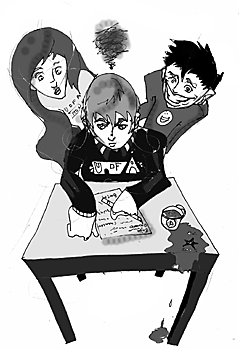
Illustration by Holly Randall
|
|
By Damion LeeNatali
Arizona Daily Wildcat
Friday, March 4, 2005
Print this
The quiet rustle of blue books is the only noise to break the silence of the classroom. You're hastily scrawling answers when you notice it - the eerie but somewhat familiar feeling of someone else's eyes on your paper. You look up, only to catch a classmate's expression as he looks away, unconvincingly feigning innocence.
Such a scene may be fictional, but it's certainly not that far removed from the reality of higher education. The notion of academic integrity seems to be under siege, with the number of infractions seeing a marked increase in recent decades. Apparently, some students have what can most charitably be described as a casual relationship with honesty. And their numbers are growing.
Donald McCabe, a professor at Rutgers University and the founding president of the Center for Academic Integrity, conducted a survey in 1999 that yielded troubling results. McCabe found that more than 75 percent of students admitted to cheating at least once in the course of their undergraduate career. Perhaps even more disturbing, he also found that between 53 to 68 percent of students at various institutions reported serious repeated cheating.
 |
|
Damion LeeNatali
Columnist
|
|
|
Such numbers are certainly disconcerting, and it's unfortunate that the UA cannot count itself as an exception to the general trend. Just last September, the Dean of Students Office reported 300 academic violations for the 2003-2004 school year. While the report showed a slight decrease in the overall number of infringements compared to the year before, it was revealed that the Eller College of Management had experienced a dramatic increase in reported cases of academic dishonesty.
Instructors' reactions to such statistics are often extreme, and hardly a course syllabus doesn't prescribe dire consequences for breaching the UA's Code of Academic Integrity. Threats of failing grades, suspensions or even expulsions are common fare for professors who wish to underscore their intolerance for cheating. The statistical evidence, though, suggests that despite their harsh rhetoric, many professors fail to pursue punishment.
McCabe's survey found that among 1,000 faculty members on 21 campuses, a full one-third were aware of student cheating but did nothing to address it. Kathleen Gabriel, a specialist in faculty and teaching assistance
development at the UA's University Teaching Center, partially faulted faculty for the decrease in reported infractions last September. "My suspicion is that (the faculty) are handling it themselves," she told the Arizona Daily Wildcat last year.
Although it might be instinctive to blame the enforcers for failing to enforce, faulting instructors for the trend in student cheating is remarkably shortsighted. Given that it's the students who are essentially perpetrating fraud, it seems only logical that students should accept the responsibility for what is ultimately a malignant habit.
There is little doubt that cheating can bring immediate rewards, many of which are understandably attractive to students. Copying on a test can lead to higher marks, and plagiarism can spare students the unpleasant experience of having to come up with their own ideas. But as with most matters of instant gratification, cheating has more profound implications that reach far beyond a tainted test or term paper.
For some students, cheating might not seem like a big deal. But to do so in an academic setting effectively devalues the work of other students as well as the dedication of the instructor. In essence, academic dishonesty is a way of saying, "I don't care enough about my classmates' efforts or my professor's commitment to do the right thing."
More importantly, though, cheating normalizes the flouting of integrity. Cutting corners in college may seem harmless, but the temptation to continue doing so can be great enough to make it a habit. Taken in that light, such a mentality helps to account for people who are often quick to endorse the notion of honesty, but who are slow to practice it themselves.
Students are frequently deluged with cynical accounts of the world that they are preparing to enter, and we predictably tire of it. We don't want to believe that the world is stark or forbidding, if only because such a worldview clashes with our sense of idealism.
Nonetheless, the truth of the matter is that moral currency is rapidly losing its value. As the future of America, college students are uniquely capable of combating this epidemic, but it will first require that we reaffirm integrity's worth in our own backyard.
Damion LeeNatali is a political science and history sophomore. He can be reached at letters@wildcat.arizona.edu.
